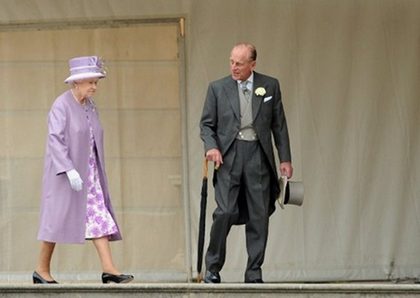SUMMARY
This is AI generated summarization, which may have errors. For context, always refer to the full article.

LONDON, United Kingdom – Prince Philip, the British royal family’s gruff patriarch who turned 91 on Sunday, has been at Queen Elizabeth II’s side throughout her 60 years as queen.
A bladder infection forced him to miss the end of her diamond jubilee celebrations earlier this June, but he has been steadfast in support of his wife at the expense of his own career and ambitions.
A peppery naval officer, the Duke of Edinburgh’s no-nonsense approach combined with his infamous and often politically incorrect off-the-cuff remarks has not made it easy for people to warm to his style.
But his unwavering, forthright style and devotion to duty has endeared him to the nation, as witnessed by the spontaneous chanting of his name by crowds sending him a get well shout at the jubilee concert.
The queen seemed visibly touched by the impromptu gesture.
In a golden wedding anniversary speech in 1997, Queen Elizabeth paid a rare public tribute to her husband.
“He is someone who doesn’t take easily to compliments,” she said.
“But he has, quite simply, been my strength and stay all these years, and I, and his whole family, and this and many other countries, owe him a debt greater than he would ever claim, or we shall ever know.”
Never one to talk about his own feelings, the prince admitted in a 2011 BBC interview that he had carved out his own role by “trial and error”. Asked if he had been successful, he replied, typically: “Who cares what I think about it?”
Prince Philippos of Greece and Denmark was born on a kitchen table in Corfu on June 10, 1921, the only son of prince Andrew of Greece — the younger brother of Greece’s king Constantine — and princess Alice of Battenberg.
His upbringing was unsettled, with his relatives often remote.
Aged just 18 months, he and his family were evacuated in a British Royal Navy ship from politically unstable Greece, with the toddler reputedly carried in a cot made from an orange box.
The family settled in Paris, sending the young Philip to preparatory school in England when he was just seven, to secondary school in southern Germany and then as a boarder at the austere Gordonstoun in Scotland.
He pursued his love of sailing and became an outstanding Royal Navy cadet before serving on battleships in the Indian Ocean and the Mediterranean.
As World War II progressed, Philip was mentioned in dispatches and promoted through the ranks on merit. By 1945, he was a first lieutenant, and was present for the Japanese surrender in Tokyo Bay with the British Pacific Fleet.
He was formally introduced to princess Elizabeth in July 1939 and they maintained regular contact throughout the war.
But it was not until July 1947 that their engagement was announced and they married that year on November 20 at London’s Westminster Abbey.
He had to give up his titles as prince of Greece and Denmark and joined the Church of England.
He took the surname Mountbatten, his maternal grandparents’ Anglicized name.
He resumed his naval career after the wedding. The couple headed to Malta, where he had been posted.
By now in command of a ship, Philip’s career was cut short by the death of king George VI in 1952, which brought his wife to the throne.
He once admitted the curtailment of his career was “disappointing”, but said that “being married to the queen, it seemed to me that my first duty was to serve her in the best way I could”.
He was a keen horseman, competing for Britain in the sport of carriage-driving after injuries to a hand tendon forced him to retire from playing polo in 1971.
He maintains a keen interest in science, technology, wildlife and the environment.
The Duke of Edinburgh’s Award scheme was set up in 1956 and aims at developing the confidence and skills of young people aged 15 to 25.
Since it was created, an estimated six million people from more than 100 countries have taken part.
In addition, he has served as patron of a number of organizations, including the World Wide Fund for Nature, and chancellor of the universities of Cambridge and Edinburgh.
Besides his 4 children, Charles, Anne, Andrew and Edward, he now has 8 grandchildren and two great-grandchildren. – Agence France-Presse
Add a comment
How does this make you feel?
There are no comments yet. Add your comment to start the conversation.